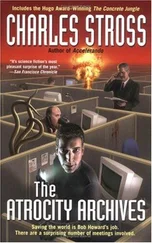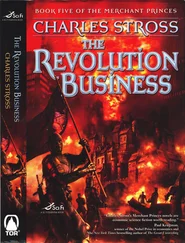Charles Stross - The Merchant’s War
Здесь есть возможность читать онлайн «Charles Stross - The Merchant’s War» весь текст электронной книги совершенно бесплатно (целиком полную версию без сокращений). В некоторых случаях можно слушать аудио, скачать через торрент в формате fb2 и присутствует краткое содержание. Жанр: sf_writing, на русском языке. Описание произведения, (предисловие) а так же отзывы посетителей доступны на портале библиотеки ЛибКат.
- Название:The Merchant’s War
- Автор:
- Жанр:
- Год:неизвестен
- ISBN:нет данных
- Рейтинг книги:5 / 5. Голосов: 1
-
Избранное:Добавить в избранное
- Отзывы:
-
Ваша оценка:
- 100
- 1
- 2
- 3
- 4
- 5
The Merchant’s War: краткое содержание, описание и аннотация
Предлагаем к чтению аннотацию, описание, краткое содержание или предисловие (зависит от того, что написал сам автор книги «The Merchant’s War»). Если вы не нашли необходимую информацию о книге — напишите в комментариях, мы постараемся отыскать её.
The Merchant’s War — читать онлайн бесплатно полную книгу (весь текст) целиком
Ниже представлен текст книги, разбитый по страницам. Система сохранения места последней прочитанной страницы, позволяет с удобством читать онлайн бесплатно книгу «The Merchant’s War», без необходимости каждый раз заново искать на чём Вы остановились. Поставьте закладку, и сможете в любой момент перейти на страницу, на которой закончили чтение.
Интервал:
Закладка:
He slid the elevator gate open and as she stepped inside she noticed the heavily built doorman just inside the entrance. "If it's safe, that works for me."
"Why would it be unsafe? To a hotel like this, any whiff of insecurity for the guests is pure poison." "Good."
Back in the room, Miriam jotted down a quick note to her sometime chief research assistant, using hotel stationery.
"Can you get this posted tonight?" she asked Erasmus. "I'm going to have that bath now..."
The bathroom turned out to be down the corridor from the bedroom, the bath a contraption of cold porcelain fed by gleaming copper pipework. There was, however, hot water in unlimited quantities-something that Miriam had missed for so long that its availability came as an almost incomprehensible luxury.
The things we take for granted, she thought, relaxing into the tub: the comforts of a middle-class existence in New Britain seemed exotic and advanced after months of detention in a Clan holding in Niejwein. I could fit in here. She tried the thought on for size. Okay, so domestic radios are the size of a photocopier, and there's no Internet, and they use trains where we'd use airliners. So what? They've got hot and cold running water, and gas and electricity. Indoor plumbing. The chambers Baron Henryk had confined her to had a closet with a drafty hole in a wooden seat. I could live here. The thought was tempting for a moment- until she remembered the thin, pinched faces in the soup queue, the outstretched upturned hats. Erasmus's hacking cough, now banished by medicines that she'd brought over from Boston-her own Boston. No antibiotics: back before they'd been discovered, a quarter to a third of the population had died of bacterial diseases. She sighed, lying back carefully to avoid soaking her brittle-bleached hair. It's better than the Clan, but still...
She tried to gather her scattered thoughts. New Britain wasn't some kind of nostalgic throwback to a gaslight age: it was dirty, smelly, polluted, and intermittently dangerous. Clothing was expensive and conservative because foreign sweatshops weren't readily available: the cost of transporting their produce was too high even in peacetime-and with a wartime blockade in force, things were even worse. Politics was dangerous, in ways she'd barely begun to understand: there was participatory democracy for a price, for a very limited franchise of rich land-owning men who thought themselves the guardians of the people and the rulers of the populace, shepherding the masses they did not consider to be responsible enough for self-determination.
It wasn't only women's rights that were a problem here-and that was bad enough, as she'd discovered: women here had fewer civil rights than they had in Iran, in her own world; at least in Iran women could vote-but here, anyone who wasn't a member of the first thousand families was second-class, unable to move to a new city without a permit from the Polis, a subject rather than a citizen. "Fomenting democratic agitation" was an actual on-the-books felony that could get you sent to a labor camp in the far north. Outright chattel slavery might not be a problem-it seemed to have fizzled away in the late nineteenth century-but the level of casual racism she'd witnessed was jarring and unpleasant.
I just want to go home. If only I knew where home is!
The water was growing cold. Miriam finished her ablutions, then returned to the hotel room. It was close and humid in the summer heat, so she raised the sash window, dropping the gauze insect screen behind it. Erasmus can let himself in, she thought, crawling between the sheets. How late will he -she dozed off.
She awakened to daylight, and Erasmus's voice, sounding heartlessly cheerful as he opened the shutters: "Rise and shine! And good morning to you, Miriam! I hope you slept well. You'll be pleased to know that your letter made the final collection: it'll have been delivered already. I'll be about my business up the corridor while you make yourself decent. How about some breakfast before we travel?"
"Ow, you cruel, heartless man!" She struggled to sit up, covering her eyes. "What time is it?"
"It's half-past six, and we need to be on the train at ten to eight."
"Ouch. Okay, I'm awake already!" She squinted into the light. Burgeson was fully dressed, if a bit rumpled-looking. "The chaise was a bit cramped?"
"I've slept worse." He picked up a leather toilet bag. "If you'll excuse me? I'll knock before I come in."
He disappeared into the corridor, leaving Miriam feeling unaccountably disappointed. Damn it, it's unnatural to be that cheerful in the morning! Still, she was thoroughly awake. Kicking the covers back, she sat up and stretched. Her clothing lay where she'd left it the evening before. By the time Erasmus knocked again she was prodding her hair back into shape in front of the dressing-table mirror. "Come in," she called.
"Oh good." Erasmus nodded approvingly. "I've changed my mind about breakfast: I think we ought to catch the morning express. How does that sound to you? I'm sure we can eat perfectly well in the dining car."
She turned to stare at him. "I'd rather not hurry," she began, then thought better of it. "Is there a problem?" Her pulse accelerated.
"Possibly." He didn't look unduly worried, but Miriam was not reassured. "I'd rather not stay around to find out."
"In that case." Miriam picked up the valise and began stuffing sundries into it. "Let's get moving." The skin in the small of her back itched. "Are we being watched?"
"Possibly. And then again, it might just be routine. Let me help you." Erasmus passed her hat down from the coat rack, then gathered up her two shopping bags. "The sooner we're out of town the better. There's a train at ten to seven, and we can just catch it if we make haste."
Downstairs, the hotel was already moving. "Room ninety-two," Erasmus muttered to the clerk on the desk, sliding a banknote across: "I'm in a hurry."
The clerk peered at the note then nodded. "That will be fine, sir." Without waiting, Erasmus made for the front door, forcing Miriam to take quick steps to keep up with him. "Quickly," he muttered from the side of his mouth. "Keep your eyes open."
The sidewalk in front of the hotel was merely warm, this early in the morning. A newspaper boy loitered opposite, by the Post Office: early-morning commuters were about. Miriam glanced in the hotel windows as she followed Erasmus along the dusty pavement. A flicker of a newspaper caught her eye, and she looked ahead in time to see a man in a peak-brimmed hat crossing the road, looking back towards them. Shit. She'd seen this pattern before-a front and back tail, boxing in a surveillance subject. "Are we likely to be robbed in the street?" she asked Erasmus's retreating back.
He stopped dead, and she nearly ran into him: "No, of course not." He didn't meet her eyes, looking past her. "I see what you see," he added in a low, conversational tone. "So. Change of plan-again." He offered her his arm. "Let's take this nice and easy."
Miriam took his arm, holding him close to her side. "What are we going to do?" she muttered.
"We're going to deliberately get on the wrong train." He steered her around a pillar box, then into the entrance to the station concourse, and simultaneously passed her a stubby cardboard ticket. "We want to be on the ten to seven for Boston, on platform six. But we're going to get on the eight o'clock to Newport, on platform eight, opposite platform six, and we're going to get on right at the front."
Miriam nodded. "Then what?"
"It's sixteen minutes to seven." He smiled and waved his ticket at the uniformed fellow at the end of the platform: Miriam followed his example. "At twelve minutes to the hour, we cross over to the right train. If we're stopped or if you miss it, remember your cover, we just got on the wrong train by mistake. All right? Let's go..."
Читать дальшеИнтервал:
Закладка:
Похожие книги на «The Merchant’s War»
Представляем Вашему вниманию похожие книги на «The Merchant’s War» списком для выбора. Мы отобрали схожую по названию и смыслу литературу в надежде предоставить читателям больше вариантов отыскать новые, интересные, ещё непрочитанные произведения.
Обсуждение, отзывы о книге «The Merchant’s War» и просто собственные мнения читателей. Оставьте ваши комментарии, напишите, что Вы думаете о произведении, его смысле или главных героях. Укажите что конкретно понравилось, а что нет, и почему Вы так считаете.












